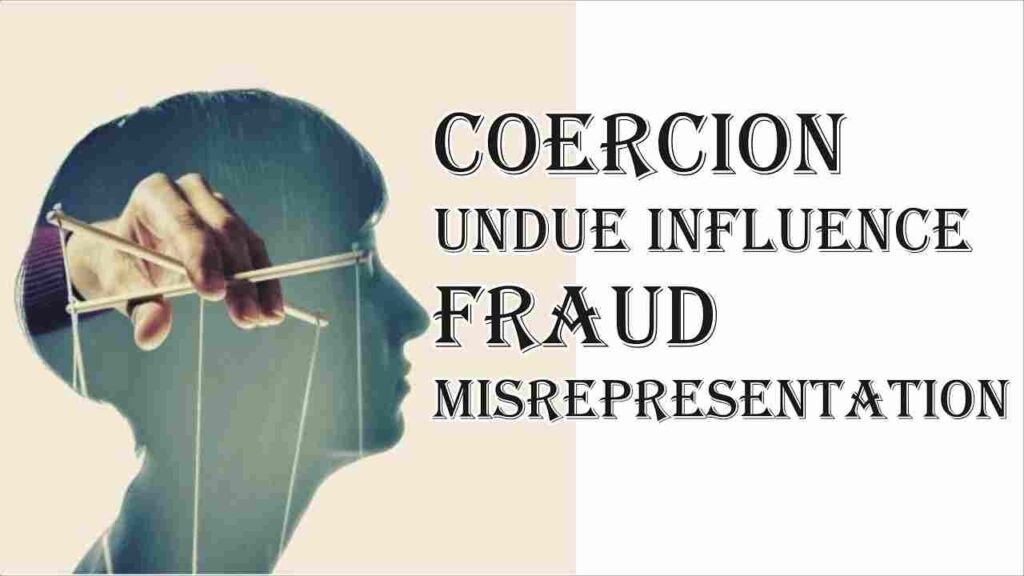
Explore 15 Difference between Coercion and Undue Influence
Coercion and undue influence, though distinct concepts, both wield significant influence over human interactions. It is imperative to grasp the dissimilarities between the two, as they have profound implications on matters of consent, autonomy, and fairness. In examining coercion and undue influence, we can discern fifteen key difference and distinctions that set them apart.
Difference between Coercion and Undue Influence
Nature: Coercion is marked by the use of force, threats, or intimidation to compel someone into compliance. Undue influence, however, relies on psychological manipulation and abuse of trust to sway a person’s decisions.
Consent: Coercion eradicates genuine consent, as it overrides an individual’s free will. Undue influence, on the other hand, may cloud consent by exploiting vulnerabilities and distorting the decision-making process.
Physical vs. Psychological: Coercion operates on a physical level, employing external pressure to enforce compliance. In contrast, undue influence targets the psychological realm, exploiting emotional ties, dependency, or authority to achieve its goals.
Manifestation: Coercion is often overt, easily identifiable through explicit threats, physical violence, or extortion. Conversely, undue influence tends to manifest subtly, concealing its presence behind subtle manipulation tactics, grooming, or isolation.
Power Dynamics: Coercion can occur between parties of varying power levels, but it typically involves a clear power imbalance, with the coercer exerting dominance over the coerced. Undue influence exploits an existing power differential, taking advantage of trust, dependency, or authority to influence the vulnerable party.
Freedom of Choice: Coercion eliminates authentic choice, leaving the coerced with limited or no alternatives. Undue influence distorts choice, making it seem as if the decision is voluntary, while underlying manipulation undermines true autonomy.
Intentionality: Coercion is deliberate and purposeful, aimed at imposing one’s will on another through force or intimidation. Undue influence may or may not be intentional, as the manipulator may exploit vulnerabilities without fully recognizing their actions.
Legal Implications: Coercion is widely condemned and illegal in many jurisdictions due to its violation of personal liberties. While undue influence may not always be illegal, it is frequently scrutinized in legal contexts, especially when it involves vulnerable individuals.
Consent Reversal: Coercion negates genuine consent, rendering any resulting agreements or actions void. In contrast, undue influence does not nullify consent but rather raises questions about the authenticity and fairness of the decision-making process.
Perception of Threat: Coercion instills fear and a sense of immediate harm, forcing compliance out of self-preservation. Undue influence may not generate the same level of perceived threat, but it can instigate fear through emotional manipulation or subtle consequences.
Timing: Coercion tends to be immediate, requiring swift compliance under duress. Undue influence is often a gradual process, taking advantage of prolonged exposure to manipulation techniques and eroding resistance over time.
External vs. Internal Factors: Coercion relies on external pressures, such as physical force or explicit threats. Undue influence primarily leverages internal factors, exploiting emotions, relationships, or cognitive vulnerabilities.
Legitimate Authority: Coercion can arise from illegitimate sources of authority, while also being wielded by those in positions of power. Undue influence typically involves a person in a position of trust, authority, or influence over the vulnerable individual.
Repercussions: Coercion frequently leads to immediate negative consequences, as compliance is forced. Undue influence may result in adverse outcomes as well, but the harm can be more insidious, manifesting in long-term psychological damage or loss of autonomy.
Legal Remedies: Coercion generally carries severe legal penalties due to its overt violation of individual rights. Undue influence, while challenging to prove, can be addressed through legal means, particularly in cases involving vulnerable individuals or significant imbalances of power.
Understanding the fundamental disparities between coercion and undue influence is crucial to safeguarding personal autonomy and promoting fairness within our society. By discerning these nuances, we can develop robust legal frameworks and ethical standards that protect individuals from manipulation, coercion, and exploitation.
Also Read: Explore the Time difference between India and Saudi Arabia